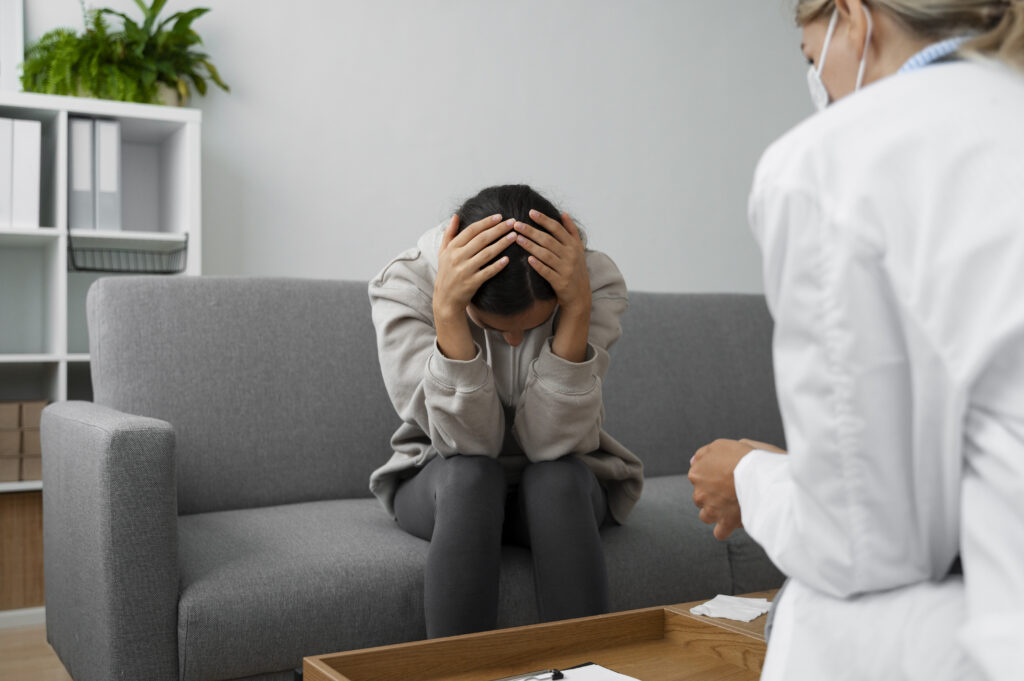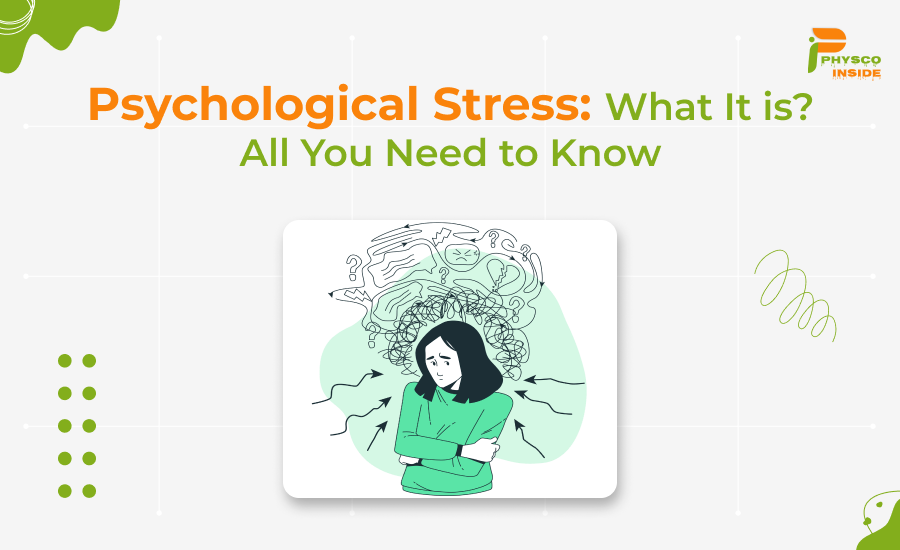(1) Introduction:
Psychological Stress is a certain part of modern life. It occurs when individuals understand situations as Considerable for their ability to cope. This can lead to personal and Physiological responses, often present as Heightened arousal and change in behavior. Understanding its problem is key due to its common impact on mental and physical health. I am writing this article. This article gives you In-depth information on every aspect of Psychological Stress. By Exploring its causes, symptoms, and management techniques. It can have serious, Unpleasant effects and build strength in facing life’s challenges.
(2) Definition:
“Psychological Stress is the response to understand a situation as scary, Challenging, or huge, leading to personal and Physiological reactions.”
It affects mental and physical health and requires effective coping Strategies for management.
(3) What is the Importance of understanding Psychological Stress?
- Understanding mental pressure is important due to its certain impact on individual health and Societal aspects.
- By understanding its problem, people can develop effective ways of coping with Hardship or stress. It Enhances their strength and Capacity to face life’s challenges.
- Additionally, Awareness of mental pressure enables Healthcare professionals to identify and address its adverse effects on mental and physical health. It also promotes overall health.
- Moreover, Societal Awareness of stress promotes Supportive environments and Policies. Its Generality and impact, finally Contribute to better and Healthier Communities.
(4) What is a Stressor?
Definition:
“Stressors are External events, conditions, or situations that cause stress, leading to Physiological and Psychological responses in individuals”.
(5) What are the Types of Stressors?
There are 4 types of Stressors.
(5.1) Environmental Stressors:
- Natural Stressors start from External Environmental factors and can include elements such as Noise, Pollution, Weather conditions, and Overcrowding.
- These Stressors can obtain Physiological responses, such as Increased heart rate and Heightened Alertness.
- Prolonged Exposure to natural Stressors may lead to chronic stress and impact overall health.
(5.2) Psychological Stressors:
- Psychological Stressors arise from internal thoughts, Feelings, and emotions rather than External factors.
- Examples include Academic anxiety, Work-related demands, financial concerns, and relationship conflicts.
- Psychological Stressors can cause Cognitive Deformation, personal Distress, and Maladaptive coping Strategies while not necessarily Surviving.
(5.3) Social Stressors:
- Social Stressors stem from Interactions with others and Societal Expectations.
- They enclose experiences such as social Rejection, Discrimination, Caregiving Responsibilities, and Interpersonal conflicts.
- Social Stressors can impact Self-esteem, social support networks, and overall mental health, particularly without enough coping Strategies.
(5.4) Biological Stressors:
- Biological Stressors involve Physiological Abnormalities within the body, often caused by illness, injury, or Hormonal changes.
- Chronic Illnesses, infections, Hormonal Imbalances, and genetic Tendencies can act as Biological Stressors.
- These Stressors can Disorder Homeostasis, leading to Inflammation, immune Suppression, and Exacerbation of Existing Health issues.

(6) What are the Psychological Stress Responses?
The body’s reaction to stress can be broken down into several Components:
(6.1) Physiology of Stress:
- When faced with a Stressor, the brain signals the release of Stress Hormones such as Cortisol and Adrenaline from the adrenal glands.
- These Hormones prepare the body for action by Increasing heart rate, blood pressure, and Respiration, Redirecting energy to Essential functions, and Suppressing Non-essential bodily Processes.
(6.2) Instinctive(natural) Reaction:
- The natural reaction is an Adaptive response to understand threats or danger.
- When Challenged with a Stressor, the body prepares for action by Activating the Sympathetic nervous system.
- It triggers Physiological changes aimed at either Confronting the threat (fight) or Escaping from it (flight). It includes Increased heart rate, Heightened Arousal, and Improved focus.
(6.3) General Adaptation Syndrome (GAS):
- General Adaptation Syndrome is a Theoretical Framework Proposed by Hans Selye to describe the body’s response to Chronic stress.
- It consists of three stages: alarm, resistance, and Exhaustion.
- During the alarm stage, the body Organizes its resources to respond to the Stressor.
- In the resistance stage, the body attempts to adapt to ongoing stress.
- If stress continues, the fatigue stage follows, Characterized by the use of resources and Increased Sensitivity to Illness.
(6.4) Neurochemical Changes During Stress:
- Stress triggers complex Neurochemical changes in the Brain, Affecting Neurotransmitter activity and brain Circuits involved in the stress response.
- Neurotransmitters like Dopamine, Serotonin, and Norepinephrine play important roles in Regulating mood, Motivation, and stress Perception.
- Continuous stress can lead to Dysregulation of these Neurochemical systems, Contributing to mood Disorders, anxiety, and other Stress-related conditions.
(7) What are the Impacts of Psychological Stress?
Here are some of the Psychological impacts of stress.
(7.1) Mental Impacts:
- Stress can weaken mental Capabilities such as attention, memory, and focus, leading to difficulties in concentration and information processing.
- Mental deformation may arise, altering perception and judgment, and potentially contributing to negative thinking patterns.
(7.2) Personal Impacts:
- Stress often causes personal reactions such as anxiety, irritability, or sadness, leading to mood swings and deep insecurity.
- Continuous stress can increase the risk of mood disorders like depression and anxiety.
(7.3) Social Impacts:
- Stress affects behavior, causing changes in appetite, sleep patterns, and coping strategies.
- Individuals may arrange avoidance behaviors, anxiety, or engage in substance abuse as maladaptive coping strategies.
(7.4) Interpersonal Impacts:
- Stress can strain relationships, leading to disputes, communication breakdowns, and ending social interactions.
- Stable relationships absorb stress.
- While strained relationships increase it, affecting overall health and social functioning.
(8) What are the Causes of Psychological Stress?
The Causes of Psychological Stress are the following:
(8.1) External Stressors
- Work-related pressure:
- High responsibility
- Deadlines
- Struggles with colleagues or bosses
- Job uncertainty
(8.2) Financial pressure:
- Debt
- Unemployment
- Financial instability
(8.3) Relationship stress:
- Marital problem
- Family issue
- Social isolation
(8.4) Environmental pressure:
- Natural disasters
- Pollution
- Noise
(8.5) Traumatic events:
- Accidents
- Violence
- Abuse
(8.6) Daily hassles:
- Traffic jams
- adjustment
- Minor arguments
(8.7) Internal Stressors:
- Psychological stressors:
- Negative thinking patterns
- Perfectionism
- Self-criticism
(8.8) Personal stressors:
- Anxiety
- Depression
- Anger
- Grief
(9) What are the Types of Psychological Stress?
(9.1) Chronic stress:
- Continue exposure to stressors
- Often linked with ongoing issues (e.g., financial problems, chronic illness)
- This can lead to long-term health conditions if not managed
(9.2) Acute stress:
- Short-term stress response to a specific event or situation
- Generally temporary – It can be severe but typically resolves once the stressor is removed or managed.

(10) How does psychological stress affect our Health?
(10.1) Physical Impacts:
- Mental stress causes physiological reactions, including increased pulse, muscle tension, and shallow breathing.
- It might lead to headaches, digestive issues, and weakened immune function, increasing vulnerability to illness.
(10.2) Emotional Impacts:
- Mental stress often presents as heightened anxiety, irritability, and mood swings.
- It can induce feelings of overwhelm, sadness, or depression, affecting interpersonal relationships and self-esteem.
(10.3) Cognitive Impacts:
- Mental stress impairs mental capability, affecting memory, concentration, and cognitive function.
- It may cause racing thoughts, difficulty focusing, and a sense of mental fog. It increases cognitive decline and increases vulnerability to anxiety disorders.
(11) Which Factors are Influencing Psychological Stress?
Three (3) main factors influence stress responses.
(11.1) Individual Differences:
- Various individual factors significantly impact how people respond to stress. These factors include personality traits such as strength, self-confidence, and coping styles.
- Strong individuals may bounce back from stressors more easily, while those with negative outlooks may struggle more.
- Genetic tendency can also affect how the brain and body respond to stress hormones like cortisol.
- Additionally, past experiences, including childhood trauma or previous exposure to stress, can shape an individual’s stress response.
(11.2) Environmental Factors:
- The environment in which individuals live and work can significantly impact their stress levels.
- Stressors such as noise pollution, overcrowding, and pollution can increase stress.
- Moreover, economic factors such as poverty, unemployment, and housing instability can create chronic stressors.
- Workplaces with high demands, low control, and limited social support can contribute to work-related stress.
- Access to green spaces, social support networks, and resources for coping can make less severe impact of environmental stressors.
(11.3) Social Factors:
- Social beliefs, values, and norms shape how individuals perceive and respond to stress.
- Social factors influence what is considered stress.
- Factors such as age, gender, and overall health status also influence how people understand and cope with stressors, fully acceptable coping mechanisms, and social support systems.
- For example, collectivist cultures may highlight family bonds and community support.
- while individualistic cultures may stress self-esteem and independence.
- The social shame surrounding mental health issues may impact help-seeking behaviors and the availability of resources for managing stress.
- Social practices such as meditation, prayer, or rituals may serve as a means of coping with stress.
- Understanding social differences is essential for providing culturally sensitive support and interventions for managing stress.
(12) How does a defensive mechanism help with Psychological Stress?
The Defensive mechanism helps with Psychological Stress in 3 ways.
(12.1) Effective Ways of Dealing with Particularly Difficult Times:
- Effective survival methods are good and practical approaches to managing stress that promote health and strength.
- These include problem-solving. Where individuals actively address the source of stress and emotion-focused coping.
- Where they manage emotions in response to stressors.
- Examples of effective survival methods include seeking social support, practicing relaxation techniques like deep breathing or meditation, engaging in physical activity, maintaining a healthy lifestyle with proper nutrition and sleep, and negative thoughts into more positive ones.
- Effective ways of dealing with particularly difficult times help individuals deal with stressful situations.
- It reduces the impact of stress on mental and physical health and encourages personal growth and resilience.
(12.2) Ineffective Survival Methods:
- Ineffective survival techniques are ineffective or harmful ways of coping with stress that can increase the problem and lead to negative outcomes.
- These include avoidance, where individuals ignore or deny the existence of stressors, and substance abuse. Such as excessive alcohol or drug use to numb emotions, and reckless behaviors like self-harm or overeating.
- Other ineffective survival methods may involve expressing anger inappropriately. It blames others for one’s problems or engaging in impulsive actions that ignore results.
- While these approaches may provide temporary relief, they often increase the underlying stress and contribute to long-term negative outcomes.
- It includes worsening mental health issues, strained relationships, and physical health conditions.
(12.3) Seeking Social Support:
- Seeking social support is an effective survival technique that involves reaching out to others for personal, instrumental, or educational support during times of stress.
- Social support can come from various sources, including family, friends, colleagues, or support groups.
- Emotional support involves receiving empathy, understanding, and comfort from others.
- While instrumental support includes real assistance like financial aid or practical advice.
- Educational support involves seeking guidance or information from knowledgeable individuals.
- Social support serves as a safeguard against the negative effects of stress, providing a sense of belonging, validation, and encouragement.
- It enhances strength, promotes coping skills, and promotes overall health.
(13) How to manage Psychological Stress?
(13.1) Stress Management:
- Stress Management includes care reflection, intense breathing activities, moderate muscle unwinding, and directed symbolism.
- These practices help people direct their physiological reactions to stretch, advance layout, and develop a feeling of smoothness and control.
(13.2) Treatment and Medication:
- Treatment and directing concept organized help and direction for overseeing mental pressure.
- Mental social treatment (CBT), Mindfulness-based stress reduction (MBSR), and acknowledgment and responsibility treatment (ACT) are successful methodologies.
- Specialists help people recognize and challenge maladaptive idea designs, encourage adapting abilities, and gather strength.
(13.3) Lifestyle Change:
- Lifestyle Changes include taking on solid tendencies like standard activity, adjusted sustenance, satisfactory rest, and using time effectively.
- Taking part in pleasant exercises, defining limits, and rehearsing taking care of oneself likewise add to pressure decrease.
- These processes upgrade prosperity and versatility to stressors.
(14) Conclusion:
Psychological Stress is a complex phenomenon with various causes and outcomes. It affects individuals emotionally, psychologically, and mentally. However, by identifying stressors, employing adaptive coping strategies, and seeking help. When necessary, individuals can make less severe negative impacts. Mental stress(psychological) serves as a reminder of the importance of self-care and strength. By understanding and managing stress effectively, individuals can try for greater health and fulfillment in their lives.
Frequently Asked Questions (FAQs)
Mental pressure is the body’s response to challenging situations perceived as threatening or overwhelming.
Common external stressors include work deadlines, financial issues, and relationship conflicts.
Stress can lead to physical symptoms such as increased heart rate, muscle tension, and headaches.
Adaptive ways of coping with stress are healthy methods of managing stress, such as deep breathing, meditation, and exercise.
Maladaptive coping methods are unhealthy ways of dealing with stress, such as substance abuse, avoidance, and self-harm.
Social support from friends, family, or support groups can provide personal comfort, practical assistance, and a sense of belonging, which can help reduce stress.


